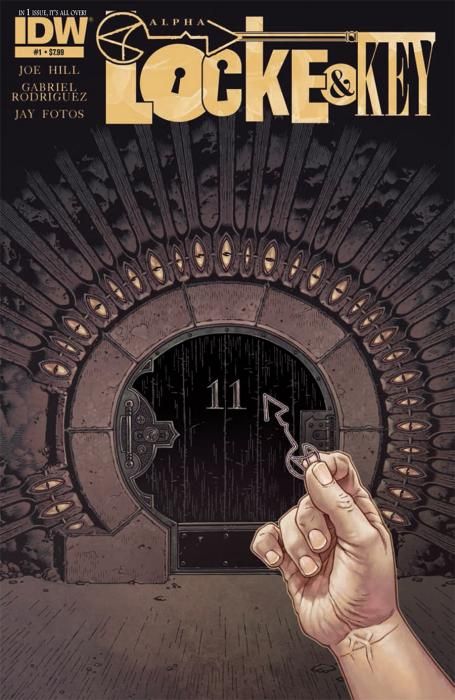"Locke and Key: Alpha" #1 by Joe Hill and Gabriel Rodriguez is the battle and climax that the entire series has been building towards. This is the big one, an inevitable convergence of all major characters on the same stage of the Drowning Cave. It's the final act of the overarching story arc between the Locke family and Dodge that has been playing out over a generation. There is one more issue of "Locke and Key: Alpha" to follow, but it will be more of a clean-up and tidying after the war.
The battle scenes in the Cave feel like a claustrophobic pile-on. While the panels feel crowded sometimes, Rodriguez keeps the action clear. Less comfortably, the underground battle panels are also crowded with dialogue. This part of Hill's storytelling feels unusually rushed and even anticlimactic. The suspense flags when Dodge delivers a "this is my evil plan" monologue worthy of a cartoon villain. All along, the Lockes and the audience have assumed that Dodge would bring through an army of his fellow demons. His actual plan has a twist. Dodge's choices also make for an oddly subdued conflict, one that is as much about psychological advantage as it is about weapons and artifacts. Too conveniently and easily, the villain's character flaws enable the heroes to gain an upper hand. All this also diminishes Dodge's stature.
In previous issues, Rodriguez was able to make Dodge-in-Bode's-body look evil, with a demon's gaze looking out from a child's eyes. When Dodge acts petulant and unimaginative in "Locke and Key: Alpha" #1, even Rodriguez can't maintain an aura of menace. This is a quibble though, because Rodriguez never loses the reader with his smooth panel transitions, and his facial expressions are essential to the impact of the last few pages.
Rufus Whedon gets his moment. His role as a true hero feels predictable, but Hill's dialogue for Rufus, still spot-on in its combination of stoic and endearing, makes it count. When Nina Locke gets a rare quiet moment to talk with Rufus in the car, their conversation is truly satisfying, as she realizes what readers have known all along.
Other aspects of the showdown are also strong. It's not the actions, but the consequences that ring true. As heavily foreshadowed from the beginning, Tyler's fishhook made of whispering iron is put to use when he makes the connection that his father hinted at, "Keys turn both ways." The solution is conceptually tidy, but imperfect and heart-wrenchingly messy in practice.
As Scot Kavanaugh says on the next-to-last page, "Okay but not okay, isn't that...human?" The fallout feels perfect for "Locke and Key," which was always an excellent combination of fantastical horror mechanics coupled with raw emotional depth. Hill and Rodriguez don't kid around. The casualties are serious, and on the final page, the reader will feel emotionally exhausted, which is in its way a vindication of the creative team's powers.

